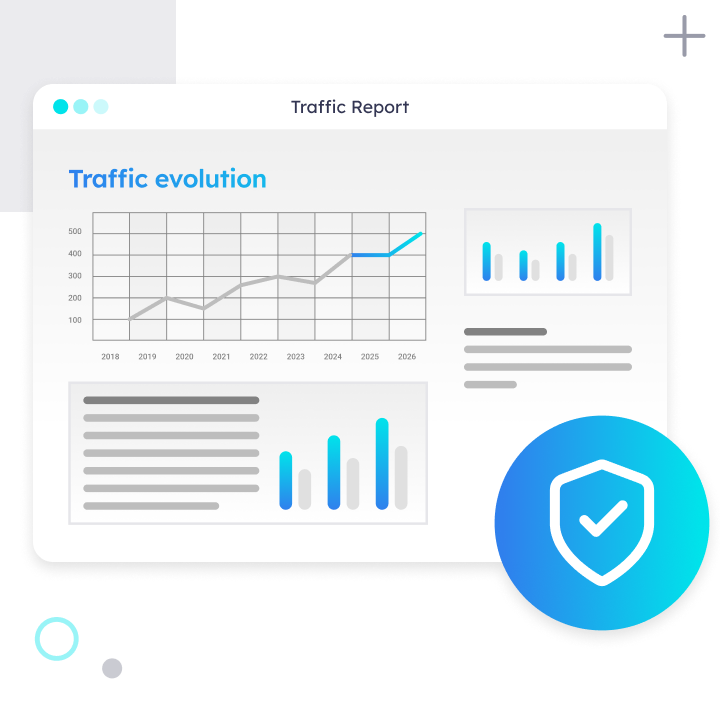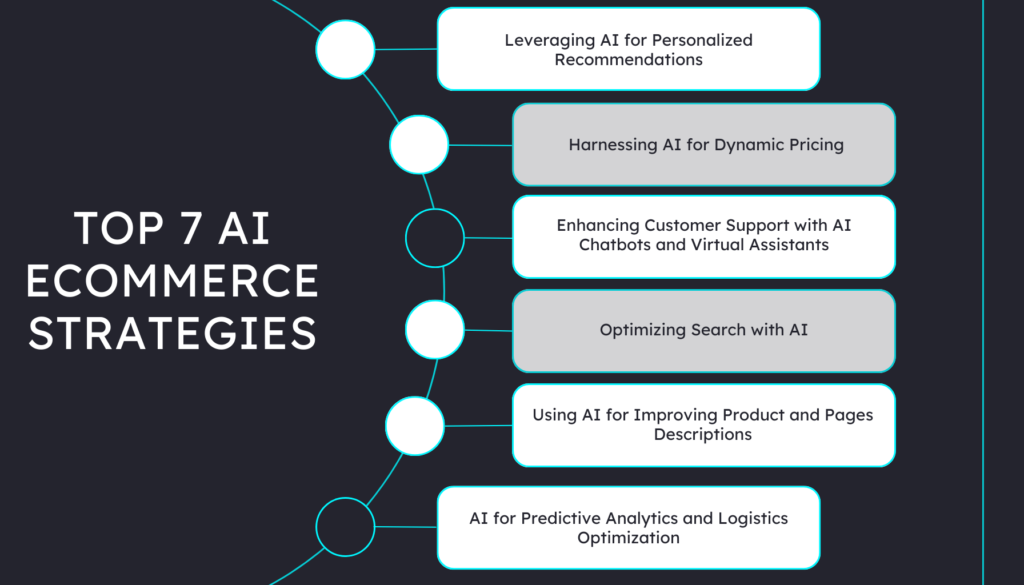
With countless online stores vying for the attention of consumers, ensuring that visitors not only browse your products but also complete purchases is a top priority. Fortunately, advancements in artificial intelligence (AI) have opened up new avenues for boosting conversion rates and enhancing the overall customer experience.
We’ll explore the top 7 proven strategies to optimize your ecommerce conversion rate with the power of AI. These strategies leverage AI technology to personalize recommendations, streamline customer support, enhance search functionality, and much more. By integrating AI into your ecommerce operations, you can gain a competitive edge and drive higher conversions.
Whether you’re a small online boutique or a large-scale retailer, implementing these AI-powered techniques will help you attract, engage, and convert customers more effectively.
1. Leveraging AI for Personalized Recommendations
When it comes to ecommerce, one-size-fits-all approaches no longer suffice. Today’s consumers expect personalized experiences that cater to their unique preferences and needs. Personalized product recommendations play a crucial role in enhancing the customer journey by guiding shoppers toward relevant and appealing items. By leveraging the power of AI, your ecommerce business can deliver highly targeted and effective product recommendations, leading to increased engagement, customer satisfaction, and ultimately, higher conversion rates.
- Collaborative Filtering Algorithms
AI-powered recommendation engines often use collaborative filtering algorithms to generate personalized recommendations. Collaborative filtering analyzes user behavior, such as purchase history, browsing patterns, and interactions, to identify commonalities with other customers. By identifying similar customers, the system can suggest products that align with their interests and preferences. This approach taps into the wisdom of the crowd, leveraging collective user data to make accurate and relevant recommendations.
- Content-Based Filtering Algorithms
Content-based filtering algorithms focus on analyzing the characteristics of products themselves to generate recommendations. By examining attributes such as product descriptions, categories, and attributes, the AI system identifies patterns and similarities. It then recommends products that match the user’s past preferences and align with their current interests. This approach is particularly effective for suggesting complementary or similar items based on the user’s previous purchases or views.
AI-powered recommendation engines go beyond simple ‘Customers who bought this also bought’ suggestions. They can offer personalized recommendations based on various factors, such as browsing history, past purchases, demographic information, and even real-time interactions. These algorithms continuously learn and adapt to user behavior, ensuring that the recommendations remain relevant and up-to-date.
2. Harnessing AI for Dynamic Pricing
In the dynamic and ever-changing world of ecommerce, pricing strategies play a vital role in driving conversions. Traditional fixed pricing models may not always be effective in capturing the attention and maximizing the value for each customer. By leveraging AI algorithms and real-time data analysis, your ecommerce business can optimize its pricing strategies to adapt to market conditions, consumer behavior, and competitive dynamics, ultimately boosting conversion rates.
- Predictive Analytics for Demand Forecasting
AI-driven dynamic pricing strategies rely on predictive analytics to forecast demand accurately. By analyzing historical data, market trends, competitor pricing, and customer behavior, AI algorithms can predict the level of demand for a particular product at any given time. This enables you to dynamically adjust prices, ensuring you remain competitive while maximizing revenue and conversions. For example, during periods of high demand, prices can be slightly increased to capture the willingness of customers to pay more.
- Real-Time Competitor Analysis
AI-powered dynamic pricing also involves real-time competitor analysis. By continuously monitoring competitors’ prices, promotions, and inventory levels, AI algorithms can adjust prices accordingly to maintain a competitive edge. For instance, if a competitor lowers their prices for a particular product, the AI system can automatically respond by offering a competitive price or additional incentives to entice customers.
Free template: CRO audit checklist
Discover everything you need to start identifying drop-offs and increase conversions.

3. Enhancing Customer Support with AI Chatbots and Virtual Assistants
In the fast-paced world of ecommerce, providing efficient and responsive customer support is vital for building trust, resolving issues, and driving conversions. AI-powered chatbots have revolutionized the customer support landscape by offering instant and personalized assistance to shoppers. These intelligent virtual assistants can handle a wide range of customer inquiries, provide product information, guide users through the buying process, and even resolve common issues. By leveraging AI chatbots, you can enhance your customer support capabilities, improve response times, and deliver exceptional experiences.
- Natural Language Processing (NLP) Capabilities
AI chatbots equipped with Natural Language Processing (NLP) capabilities can understand and interpret customer inquiries in a human-like manner. By analyzing the context, intent, and sentiment behind customer messages, NLP-powered chatbots can provide accurate and relevant responses. This allows for more natural and engaging conversations, creating a seamless customer support experience.
- Integration with Knowledge Bases and FAQs
AI chatbots can be integrated with knowledge bases and frequently asked questions (FAQs) to instantly access a wealth of information. This enables chatbots to provide accurate and up-to-date responses to customer queries, saving time and effort for both customers and support agents. By automating the retrieval of relevant information, chatbots can swiftly address common inquiries and provide consistent answers across multiple customer interactions.
AI-powered chatbots offer several benefits for your ecommerce business. They can handle a high volume of customer inquiries simultaneously, ensuring prompt responses and reducing customer wait times. Moreover, chatbots are available 24/7, providing round-the-clock support to customers in different time zones. This level of accessibility enhances the overall customer experience, building loyalty and increasing the likelihood of conversions.
However, it’s important to strike the right balance between AI chatbot interactions and human support. While chatbots excel at handling routine inquiries, complex or sensitive issues may require human intervention. Integrating chatbots with seamless escalation paths to human agents ensures a smooth transition when necessary.

4. Optimizing Search with AI
Providing a seamless and efficient search experience is crucial for helping customers find the products they need quickly and effortlessly. Traditional search systems may fall short when it comes to understanding user intent and delivering relevant results. By leveraging AI algorithms, you can optimize your search functionality, improve search accuracy, and enhance the overall customer experience.
- Natural Language Processing (NLP) for Better Understanding User Queries
AI-powered search algorithms equipped with Natural Language Processing (NLP) capabilities can better understand and interpret user queries. NLP enables the system to analyze the context, semantics, and intent behind search queries, allowing for more accurate and contextually relevant search results. This helps customers find the products they are looking for even if they don’t use specific keywords or phrases.
- Machine Learning for Search Relevance and Personalization
AI-powered search algorithms can leverage machine learning techniques to improve search relevance and personalization. These algorithms analyze user behavior, such as search history, click-through rates, and purchase patterns, to learn and adapt to individual preferences. By continuously refining search results based on user feedback, the system becomes more attuned to the unique needs of each customer, leading to more personalized and accurate search results.
AI-optimized search functionality goes beyond basic keyword matching. It can understand the intent behind the search queries, recognize synonyms and related terms, and offer relevant suggestions based on user preferences. This enables customers to discover products more efficiently and increases the chances of conversion.
Implementing AI-powered search functionality requires the integration of AI algorithms with an ecommerce platform or search engine. This allows for real-time analysis of user queries, catalog data, and customer behavior to deliver optimal search results.
5. Using AI for Improving Product and Pages Descriptions
When it comes to ecommerce, the power of persuasive and engaging product descriptions cannot be overstated. Well-crafted descriptions have the potential to capture the attention of customers, highlight unique selling points, and compel them to make a purchase.
For instance, AI-powered NLP techniques can be employed to improve the quality and clarity of product descriptions. NLP algorithms can analyze the language used in the descriptions, identify areas for improvement, and suggest changes to enhance readability, grammar, and overall effectiveness. This ensures that the descriptions are engaging, informative, and compelling to customers.
AI can also be leveraged to optimize product descriptions for search engine visibility. AI algorithms analyze popular search queries, relevant keywords, and search trends to identify the most effective keywords to incorporate into the descriptions. By optimizing product descriptions with relevant keywords, you can improve your search engine rankings, attract more organic traffic, and increase the likelihood of conversions.
6. AI for Predictive Analytics and Logistics Optimization
Staying ahead of customer demands and optimizing logistics operations are crucial for success. Predictive analytics, powered by AI technology, can provide valuable insights into customer behavior, inventory management, and supply chain operations. By leveraging AI for predictive analytics, you can make data-driven decisions, streamline logistics processes, and enhance overall efficiency.
- Customer Lifetime Value Prediction
AI algorithms can analyze historical customer data to predict customer lifetime value (CLV). By considering factors such as purchase history, frequency, average order value, and customer engagement, predictive models can forecast the potential value a customer will bring to the business over their entire lifetime. This insight enables you to prioritize customer acquisition efforts, personalize marketing strategies, and optimize customer retention initiatives.
- Churn Prediction and Proactive Retention Strategies
AI-powered predictive analytics can also identify customers who are at risk of churning or discontinuing their relationship with your business. By analyzing customer behavior patterns, purchase history, and engagement metrics, AI algorithms can predict the likelihood of churn. Armed with this information, you can implement proactive retention strategies, such as targeted offers, personalized communication, or loyalty programs, to mitigate churn and increase customer loyalty.
- Demand Forecasting for Inventory Management
AI-driven demand forecasting techniques can optimize inventory management processes. By analyzing historical sales data, market trends, and external factors like seasonality or promotions, predictive models can accurately forecast future demand for products. This helps you optimize inventory levels, prevent stockouts, reduce overstock situations, and improve supply chain efficiency.
7. Incorporating AI for Customer Sentiment Analysis
Understanding customer sentiment is crucial to gauge customer satisfaction, identify areas of improvement, and tailor their strategies accordingly. AI-powered customer sentiment analysis enables you to gain insights into customer emotions, opinions, and attitudes toward their products, services, and brand. By incorporating AI for customer sentiment analysis, you can proactively respond to customer feedback, enhance customer experiences, and drive higher conversions.
- Natural Language Processing (NLP) for Sentiment Classification
AI algorithms equipped with Natural Language Processing (NLP) capabilities can analyze customer reviews, feedback, and social media posts to classify sentiment. By analyzing the language, context, and tone of customer expressions, NLP-powered sentiment analysis algorithms can determine whether sentiments are positive, negative, or neutral. You can gain a comprehensive understanding of customer perceptions and emotions.
- Social Media Monitoring and Sentiment Tracking
AI-powered sentiment analysis can be applied to social media monitoring, so you can track and analyze customer sentiment expressed on platforms like Twitter, Facebook, or Instagram. By monitoring mentions, hashtags, and comments, you gain real-time insights into customer sentiment, identify trends, and promptly address any concerns or issues that arise. You can engage with customers proactively and build stronger relationships.
Increase +180%
leads
demos
sales
bookings
from your website with AI
Get more conversions from your existing website traffic delivering personalized experiences.

Conclusion
From personalized recommendations and dynamic pricing to AI chatbots and enhanced search functionality, these strategies empower you to deliver exceptional customer experiences. By harnessing the capabilities of AI, ecommerce companies can offer tailored product suggestions, competitive pricing, efficient customer support, and seamless product discovery.
AI-driven customer segmentation allows you to target specific audience segments with precision, resulting in more effective marketing campaigns and increased conversions. By employing AI for improved product descriptions and sentiment analysis, you can better understand customer preferences and emotions, driving engagement and loyalty.
With AI as a powerful ally, you can unlock the full potential of your ecommerce business, maximize conversions, and stay ahead of the competition. As AI technology continues to evolve, embracing these strategies will provide you with a significant advantage in delivering personalized experiences, optimizing operations, and fostering long-term customer relationships.





